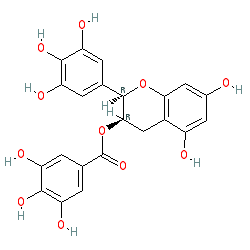|
Abbreviated name: EGCG
Synonyms: EGCG | epigallocatechin gallate
Compound class:
Natural product or derivative
Comment: Epigallocatechin-3-gallate (EGCG) is one of the catechins that are found in green tea. It had been ascribed activity as a histone acetyltransferase (HAT) inhibitor. However, a 2017 article by Dahlin et al. suggests that the thiol-reactivity of EGCG brings in to question its activity as a HAT inhibitor [4]. Amongst the plethora of health benefits attributed to the catechins, EGCG has demonstrated broad-spectrum antiviral activity [1,6-9].
SARS-CoV-2 and COVID-19: In relation to SARS-CoV-2, molecular docking analysis suggests that EGCG interacts with the virus' S protein and main protease (Mpro; 3CLpro) [11]. Evidence also suggests that catechins bind to the S1 ubiquitin-binding site of the virus' second protease PLPro. It is hypothesised that inhibiting PLPro will reduce the enzyme's inhibitory function on the host ubiquitin proteasome and interferon stimulated gene systems, thus targeting some of the inflammatory aspects of SARS-CoV-2 infection. Ligand Activity Visualisation ChartsThese are box plot that provide a unique visualisation, summarising all the activity data for a ligand taken from ChEMBL and GtoPdb across multiple targets and species. Click on a plot to see the median, interquartile range, low and high data points. A value of zero indicates that no data are available. A separate chart is created for each target, and where possible the algorithm tries to merge ChEMBL and GtoPdb targets by matching them on name and UniProt accession, for each available species. However, please note that inconsistency in naming of targets may lead to data for the same target being reported across multiple charts. ✖ |
|
|||||||||||||||||||||||||||||||||||
| No information available. |
Summary of Clinical Use  |
| Epigallocatechin-3-gallate (EGCG) has been evaluated as a therapeutic tool in patients with Down's syndrome, for efficacy to improve cognitive deficit. Click here to link to ClinicalTrials.gov's list of EGCG studies that also mention DYRK1A. EGCG has been deployed as a potential COVID-19 therapeutic [3]. |
| Clinical Trials | |||||
| Clinical Trial ID | Title | Type | Source | Comment | References |
| NCT01699711 | Normalization of dyrk1A and APP Function as an Approach to Improve Cognitive Performance and Decelerate AD Progression in DS Subjects: Epigallocatechin Gallate as Therapeutic Tool | Phase 2 Interventional | Parc de Salut Mar | Results from this Phase 2 trial were published in 2016. EGCG alone did not have an effect on cognitive function, but EGCG plus cognitive training for 12 months improved visual recognition memory, inhibitory control, and adaptive behaviour compared to placebo plus cognitive training. | |







